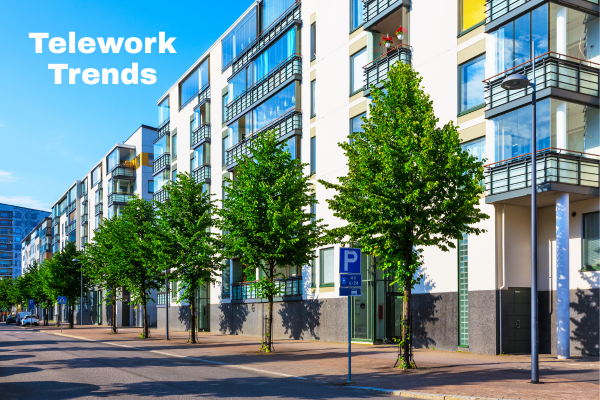
The National Association of Home Builders (NAHB) Eye on Housing report for 2025 highlights the sustained rise of telework, with remote and hybrid work models continuing to influence the U.S. workforce. In Metro Atlanta, a hub for tech, finance, and professional services, these trends are significantly impacting both residential and commercial real estate markets. This blog explores how telework is reshaping Metro Atlanta’s housing and office landscapes, offering insights for buyers, sellers, and investors, along with expert guidance from Jhenesis Properties.
Telework Trends in 2025: Key NAHB Insights
The NAHB’s 2025 report reveals that approximately 35% of U.S. workers are engaged in remote or hybrid work, with higher adoption in urban and suburban areas like Metro Atlanta. Industries such as technology and professional services, which are prominent in Atlanta, report over 50% of employees working remotely at least two days per week. This shift has led to a growing demand for homes with dedicated workspaces and flexible commercial spaces, directly influencing Metro Atlanta’s real estate dynamics.
Key telework statistics:
- Over 50% of new single-family homes built in 2024 were two or more stories, catering to teleworkers needing space for home offices.
- Tech-driven employees prioritize high-speed internet and adaptable home layouts.
- Hybrid work models are driving demand for premium, tech-enabled office spaces.
Impact on Metro Atlanta’s Residential Real Estate Market
1. Demand for Homes with Home Offices
Telework has transformed homebuyer preferences in Metro Atlanta, with a focus on properties featuring dedicated home offices, high-speed internet, and versatile spaces. According to Redfin, Metro Atlanta’s median home price was $426,000 in May 2025, up 0.3% year-over-year, but homes with extra bedrooms or finished basements for offices are fetching premiums. Neighborhoods like Virginia Highland and Old Fourth Ward remain popular, despite a 45.2% price correction in Virginia Highland due to market adjustments.
Tip: Sellers should emphasize home office features in listings to attract teleworkers. Buyers should prioritize properties with fiber-optic connectivity, especially in suburbs like Alpharetta or Roswell.
2. Suburban and Exurban Growth
The NAHB report notes that teleworkers are less tied to urban centers, boosting demand for homes in Metro Atlanta’s suburbs and exurbs. Areas like Gwinnett, Cobb, and Forsyth Counties offer larger lots, affordability, and quieter settings ideal for remote work. Atlanta’s housing market is cooling slightly, with a 1.4% dip in median home prices ($360,000) and homes staying on the market longer (47 days on average). This trend benefits teleworkers seeking spacious homes at competitive prices.
Tip: Investors can target suburban rental properties tailored to teleworkers, while buyers can leverage increased inventory in areas like Marietta or Suwanee for better deals.
3. Declining Investor Activity
The NAHB report indirectly points to a cooling investor market, with a 65% drop in investor purchases in Atlanta since the pandemic peak, per Newsweek. As teleworkers prioritize suburban homes over urban rentals, investor activity near job centers like Buckhead has slowed, with homes now averaging 94 days on the market. This shift increases inventory, giving teleworkers more options.
Impact on Metro Atlanta’s Commercial Real Estate Market
1. Reimagined Office Spaces
Hybrid work models are reshaping Metro Atlanta’s commercial real estate. Companies are downsizing traditional offices and investing in flexible, tech-enabled workspaces. Cushman & Wakefield’s Q1 2025 MarketBeat report shows 1.6 million square feet of new office leases in Atlanta, up 14.2% year-over-year, with demand for premium spaces in Midtown and Buckhead driven by law firms and tech companies.
Tip: Commercial property owners should upgrade spaces with collaboration hubs and advanced tech to attract hybrid-work employers.
2. Growth in Mixed-Use Developments
Telework is fueling demand for mixed-use developments that blend residential, retail, and office spaces. Neighborhoods like Old Fourth Ward are thriving, with 4,915 multifamily units absorbed in Q4 2024, per NAHB data. These live-work-play communities appeal to teleworkers seeking convenience and reduced commutes.
Future Outlook for Metro Atlanta’s Real Estate Market
The NAHB predicts stabilization in the multifamily sector by late 2025, despite high interest rates, as new projects become viable. Residential markets may see stable or slightly lower prices due to increased inventory, offering opportunities for teleworkers. However, high mortgage rates (peaking above 7% in 2023) could slow growth unless rates decline, as forecasted by FMLS.
Partner with Jhenesis Properties

Navigating Metro Atlanta’s evolving real estate market requires expert guidance. Whether you’re a buyer seeking a telework-friendly home, a seller looking to highlight your property’s remote-work features, or an investor exploring suburban opportunities, Jhenesis Properties is here to help. With deep knowledge of Atlanta’s neighborhoods and market trends, our team can guide you to success. Contact us today at 770-309-9213 or visit jhenesisproperties.com to start your real estate journey.
FAQ: Telework and Metro Atlanta Real Estate
Q: How is telework affecting home prices in Metro Atlanta?
A: Telework is driving demand for homes with office spaces, pushing prices up for such properties, though overall market cooling has led to a 1.4% dip in median prices ($360,000) as of 2025.
Q: Which Metro Atlanta neighborhoods are best for teleworkers?
A: Neighborhoods like Virginia Highland, Old Fourth Ward, and suburban areas like Alpharetta, Roswell, and Marietta are popular for their spacious homes and high-speed internet access.
Q: How can I make my home appealing to teleworkers?
A: Highlight dedicated office spaces, modern wiring for high-speed internet, and flexible rooms in your listing. Staging a home office can also attract buyers.
Q: Is now a good time to invest in Atlanta real estate?
A: With a 65% drop in investor activity and increased inventory, 2025 offers opportunities for strategic investments, especially in suburban rental properties for teleworkers.
Q: How can Jhenesis Properties help me?
A: Jhenesis Properties offers personalized real estate services, from finding telework-friendly homes to advising on commercial investments. Call 770-309-9213 or visit jhenesisproperties.com for expert support.
Sources: NAHB Eye on Housing, Redfin, Cushman & Wakefield MarketBeat, Newsweek, FMLS.
